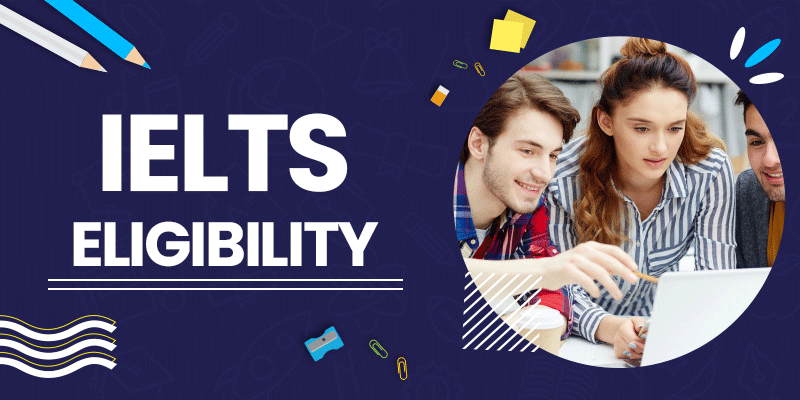IELTS Exam Eligibility and Qualification

The Ultimate Guide to Studying Abroad: Costs, Consultants & Visa Requirements
February 11, 2025
Top 10 IELTS Institute in Dehradun 2025
May 27, 2025The International English Language Testing System (IELTS) is your gateway to studying, working, or migrating abroad. Recognized by over 11,000 institutions worldwide, IELTS serves as proof of your ability to communicate in English. But how do you know if you’re eligible to apply? And what qualifications do you need?
This guide unpacks everything about IELTS eligibility and qualifications, from who can apply to tips to nail the test on your first attempt. Whether you’re aiming for Canada, the UK, Australia, or the USA, here’s everything you need to know to get started.
What is IELTS, and Why Is It Important?
IELTS is an internationally recognized English proficiency test. It’s widely accepted by universities, employers, and governments around the world. Depending on your needs, you may take one of two types of IELTS tests:
- IELTS Academic: For studying in universities or professional registration.
- IELTS General Training: For migration or general work experience in English-speaking countries.
The exam evaluates your skills in Listening, Reading, Writing, and Speaking, ensuring you can effectively use English in everyday scenarios.
Who Can Apply for IELTS?
Eligibility Criteria:
Good news! IELTS doesn’t have strict eligibility restrictions. Essentially, anyone who aspires to study, work, or migrate abroad can apply.
Age Limit Explained:
There’s no upper age limit for IELTS. However, the minimum recommended age is 16 years. This ensures test-takers have enough educational exposure to handle the exam’s complexities.
Nationality Restrictions:
There are no nationality-based restrictions for IELTS. Whether you’re from India, South Korea, Nigeria, or Brazil, you can register for the exam and receive a score accepted globally.
Minimum Educational Qualification for IELTS
Do you need a college degree to appear for IELTS? Not at all! There’s no formal requirement regarding academic qualifications.
- What You DO Need: A good command of the English language. Test success relies on proficiency, not your formal education level.
- Common Myth Busted: Some believe graduation is mandatory to register for IELTS. This is incorrect. Even high school students can apply if they meet the age criterion.
Documents and Registration Process
Documents Needed for Registration
When signing up for the IELTS exam, ensure you have the following:
- A valid passport or national identity card (depending on your country).
- A recent passport-sized photograph.
Confirm that your ID is up to date, as expired documents can lead to disqualification.
How to Register
- Visit the official IELTS website or an authorized center.
- Complete the online registration form.
- Select a test date, test type, and location.
- Make the payment.
Payment Details
IELTS exam fees vary by country but typically fall between $185 and $260. Payment can be made online via debit/credit cards or through bank transfers, depending on your local test center.
Age Limit for IELTS Test Takers
The minimum age for appearing in the IELTS exam is 16 years, though there are exceptions for younger candidates in special cases, such as those applying for secondary study abroad. There is no maximum age limit.
If you’re under 18, parental or guardian consent may be required while registering. Check with your test center for specifics.
How Many Times Can You Attempt IELTS?
Good news for repeat test-takers! IELTS places no limit on the number of attempts. You can take the test as many times as you want, provided you’re willing to pay the test fee.
Retaking the Test
It’s generally advised to leave a minimum gap of eight weeks before retaking the exam. Use this time to focus on weak areas and practice targeted improvements.
Test Retake Tips:
- Identify low-scoring sections and focus your studies there.
- Take mock tests to gain confidence.
- Consider professional coaching if needed.
Academic vs General IELTS
Here’s a breakdown to help you decide which test to take:
- IELTS Academic: Required for university admissions and professional registration in English-speaking countries.
- IELTS General Training: Needed for immigration purposes or employment-focused routes.
Choose based on your goals and verify with the institution or immigration authority you’re applying to.
Test Format and Scoring
Test Sections
IELTS consists of four sections that test key language skills:
- Listening: 30 minutes.
- Reading: 60 minutes.
- Writing: 60 minutes.
- Speaking: 11–14 minutes (one-on-one with an examiner).
Scoring System
IELTS uses a band score system from 1 to 9:
- 1-4: Limited or below-basic English proficiency.
- 5-6: Moderate proficiency.
- 7-8: Good to excellent English ability.
- 9: Exceptional command of English.
Most universities and migration programs require a minimum band score of 6.5 or higher.
IELTS Requirements by Country
Here’s the typical IELTS score needed for popular destinations:
- Canada: Band 6.5 (Academic for studying, General for migration).
- UK: Band 6.5 to 7.0 for most universities.
- Australia: Band 6.0 for general immigration.
- USA: Band 7.0 (mostly Academic IELTS).
- New Zealand: Band 6.5 (General for PR purposes).
Check your desired institution’s or immigration authority’s website for specific requirements.
Tips to Qualify for IELTS on the First Attempt
- Choose a Preparation Method: Decide between self-study or enrolling in an expert-led coaching institute.
- Use Reliable Study Resources: Popular options include the IELTS Official Guide, Cambridge IELTS Practice Books, and apps like IELTS Prep by British Council.
- Practice Time Management: Allocate sufficient practice time to each section and mimic test-day conditions.
- Focus on Weak Points: Struggle with writing or speaking? Focus on high-impact activities like grammar drills, vocabulary building, and practicing mock interviews.
Common Questions About IELTS Eligibility
Can I take IELTS without a passport?
No. A valid passport is typically required unless your country accepts an alternative national ID.
How long is the IELTS score valid?
IELTS scores are valid for two years from the test date.
Is it hard to crack IELTS?
Not if you’re well-prepared. With the right resources, practice, and time management, it’s achievable.
Start Planning for IELTS Today
The IELTS exam is much more than a test; it’s your ticket to global opportunities. By understanding its requirements and preparing strategically, you can increase your chances of success on your first try.
Take the next step confidently. Begin with thorough research or enroll in a coaching program to refine your skills. Success, after all, starts with good preparation.


